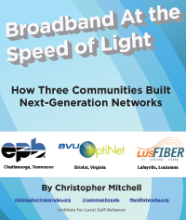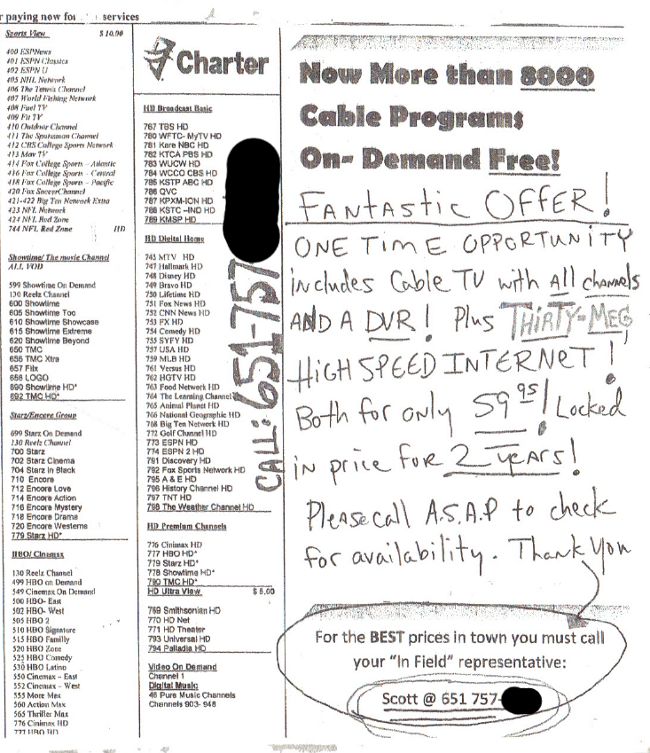
Fast, affordable Internet access for all.

Susan Crawford on the importance of government policy. People who are concerned about the future of the Internet need to pay attention or the cable and telephone companies will take over the Internet (or at least access to it). Not because they are evil, but because what is best for them (or what they think is best for them in the short term) is not what is best for the rest of us or the vast majority of businesses that depend on access to the Internet.

David Cameron, city administrator, said the proposal is not so much about dissatisfaction with current providers as it is about finding new revenue for the city. Cameron said revenue from electric services has been a key source of funding for various projects and necessities for the city. That “enterprise” fund is getting smaller, Cameron said, and an alternative funding source is needed. “We have done a good job managing accounts, building a reserve,” Cameron said. “We want to keep building on the programs we have. It takes money and funds to do that.” City officials discussed the issue for the last 18 months and decided to put it to a referendum. Voters will decide the issue May 22.That is a fairly unique reason. Most communities want to build these networks to encourage economic development and other indirect benefits to the community. Given the challenge of building and operating networks, few set a primary goal of boosting city revenue.

If approved by voters, the city plans to spend $8.3 million to install 100 miles of fiber optic cable directly to homes and businesses. The city should be able to repay the debt in 12 years, if things go according to a feasibility study presented to the city’s board of directors in January.
“We are partnering with DISH Network to provide more entertainment options to consumers through different mediums. DISH is at the forefront of recognizing that more and more people are changing the way they watch TV and that fewer of them are viewing their favorite programs on schedules determined by the content providers,” said Todd Marriott, Executive Director of UTOPIA. “DISH Network is one of the best content delivery companies out there, and we’re grateful to be doing business with them to offer content people want at a reasonable price.”Securing a major ISP to operate on the UTOPIA network is a big win in part because of the marketing potential. While many UTOPIA customers are happy with their ISP, the ISPs are limited in their capacity to advertise. As a national company, DISH may be well poised to bring a many new subscribers to the network. DISH also seems to be trying to get beyond just delivering TV channels. The discussion in the press release about sling-technologies suggest that DISH is concerned that its subscribers need better connectivity to the Internet to take full advantage of the technology DISH is offering them. Jesse has given this some thought at Free UTOPIA:
First, let’s consider that DISH already has a lot of customers in UTOPIA areas. They could immediately start marketing both data and voice service to those subscribers. Given that they can cross-subsidize using revenues from other markets, using the MStar tactic of aggressive marketing would be sustainable. They also have installation and customer service staff in place to handle that influx. That cross-subsidy can also help them pick up new customers on a triple-play package. One of the main barriers to signing up new customers has been the acquisition cost. DISH could potentially opt to subsidize or entirely eat the install cost as a way of speeding up deployment, something they have the cash to do.
 Download a higher resolution PDF here.
Charter has taken a package for which it charges $145/month in Rochester, Duluth, Lakeville, and nearby Buffalo (MN) and is offering it for $60/month - price guaranteed for 2 years. A Monticello resident supplied us with this flyer, which this person had received multiple times at their home over the course of a month. (See below for the full flyer).
Download a higher resolution PDF here.
Charter has taken a package for which it charges $145/month in Rochester, Duluth, Lakeville, and nearby Buffalo (MN) and is offering it for $60/month - price guaranteed for 2 years. A Monticello resident supplied us with this flyer, which this person had received multiple times at their home over the course of a month. (See below for the full flyer).
 This is either predatory pricing or the cable industry is out of control with its rate increases. If that package costs Charter more than $60/month to supply, then it is engaging in predatory pricing to drive competitors out of the market. Consider that Charter may be taking a loss of $20/month ($240/year) from each household that takes this offer.
This is either predatory pricing or the cable industry is out of control with its rate increases. If that package costs Charter more than $60/month to supply, then it is engaging in predatory pricing to drive competitors out of the market. Consider that Charter may be taking a loss of $20/month ($240/year) from each household that takes this offer.The Coalition for the New Economy — which works to ensure “that investments in broadband networks are used efficiently and effectively”— wrote Tuesday that “funding for government-owned broadband networks is very often duplicative,” and “diverts local funds from public safety and education. ... Christopher Mitchell of Community Broadband Networks tells the Independent that official U.S. government policy believes “we can have proper competition if every competitor builds their own network, and that is not at all supported by reality.”This group is emphatically supporting less competition because the private sector does not want to overbuild other private networks. If the public is not allowed to build next-generation networks where private companies already operate last-generation networks, communities will have neither modern connections nor real choices. The cable and DSL companies are arguing that no one should be allowed to build public interstates where private dirt roads exist. We live in a democracy. We are supposed to be free to choose the best policies in promoting infrastructure. We can choose a future where we are more dependent on a few absentee massive corporations or one in which we have more control over our future. We can pursue policies that would result in real choices among broadband service providers or we can continue the status quo, where choices dwindle. Below, I have included an excellent debate from last year in which the above points are fleshed out over 2 hours.
We are running a guest commentary today. Eric Null is a third-year law student at Cardozo Law School in New York City. He is passionate about corporate and intellectual property law, as well as technology and telecommunications policy. Follow him @ericnull or check out his papers. While researching a paper about municipal broadband networks, I was struck by the tremendous benefits that municipal networks can provide. It can be the first high-speed Internet link for an area without broadband, or it can provide some much-needed competition in areas that currently have access to broadband, but for some reason that existing access is unsatisfactory (e.g. price, service). Municipalities, in theory, can run the network for the benefit of the public rather than with a vicious profit maximization motive. Indeed, municipal networks bring many benefits. But first, a little history. In the United States, cable providers have set up regional monopolies for themselves, and “competitors” such as DSL and satellite are characterized by slower connection speeds and it is arguable that they are actual substitutes to cable access. Certainly within the cable industry, any “competitive” cable company attempting to compete with incumbents is met with high costs of building new infrastructure and lack of customer base. Municipalities can pick up where smaller, private entities cannot succeed. Municipalities have had a long history of investing in critical infrastructure, and they have the mentality for long-term planning that private companies simply cannot enjoy. A large company like Verizon likely has to justify any expansion of its network to its investors and ensure them that the venture will return a profit relatively quickly. Not so with municipalities; a city network allows its citizens to benefit indirectly (and directly) over the long-term. Thus, city governments can be a formidable competitor in the telecom and cable industries. Some states, regrettably, have banned or restricted the practice. In Nixon v.
A municipal government cannot possibly hope to compete with well-capitalized broadband providers in a highly competitive market.For those unfamiliar with Heartland, they don't use the same definitions for common words like "competitive" as the rest of us do. In Heartland's world, "competitive" means a market in which one of our funders operates regardless of how much competition exists in it. So why do we need new legislation to make it even harder for communities to build the networks that the cable and DSL companies won't build?